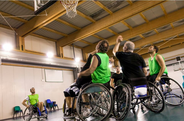The Commission has published a study that seeks to promote best practice for providing enhanced opportunities for individuals with disabilities to be involved in organised sports. There are an estimated 80m people with a disability in the European Union (EU), equivalent to approximately 15% of the EU population. Disabled people are less likely to take part in organised sport than non-disabled individuals, this despite the many positive benefits of participation.
This report has collected information on the participation of people with disabilities in sport – to better understand the individual, social and environmental barriers that may make participation in sports more difficult for disabled individuals. Expanded opportunities and targeted funding – towards, for instance, more conveniently located facilities or better-trained professional staff – can thereby better equip individuals with the tools they need to join organised sports.
The study also analyses three main benefits of sport participation for people with disabilities: personal health, individual development and social benefits, with a hopeful outcome of enlisting community leaders to promote the importance of sport opportunities for people with disabilities. The EU is a signatory to the UN Convention on the Rights of Persons with Disabilities, which highlights Commission and Member States’ obligation to take appropriate measures to make sports inclusive - specifically requiring persons with disabilities to be able to participate on an equal basis with others in recreational, leisure and sporting activities. Reports such as these are therefore vital to creating an environment where everyone – regardless of disability – has the opportunity to take part.
See the section below to read the complete report as well as the executive summary of this report.
Source: European Commission

